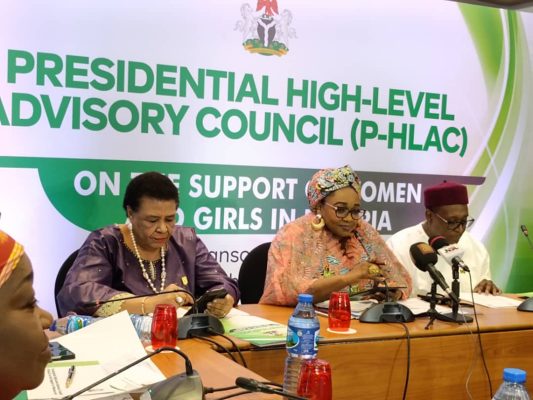…₦1.6 trillion needed to implement roadmap in five years
The Federal Government has reiterated the need for urgent and coordinated national action to accelerate the empowerment and inclusion of Nigerian women and girls, urging all stakeholders to move beyond commitments and deliver tangible outcomes across the country.
This formed the core of discussions at the Presidential High-Level Advisory Council (P-HLAC) on the Support of Women and Girls in Nigeria, held on Thursday at the Transcorp Hilton, Abuja. The event aimed to strengthen national dialogue and strategic collaboration to advance women’s empowerment across all sectors. It was attended by ministers, traditional rulers, development partners, civil society representatives, and other key stakeholders.
In her address, the Minister of Women Affairs, Imaan Sulaiman-Ibrahim, described the gathering as a critical moment of reflection and recommitment. It coincided with several global milestones, including the 30th anniversaries of the Beijing Declaration and Platform for Action, the Women’s Rights Movement, the UN Agenda for Social Development, and the 25th anniversary of the Women, Peace, and Security Agenda.
She acknowledged the progress made so far but emphasized that significant barriers still hinder the advancement of women and girls in Nigeria.
“Women make up over 50% of Nigeria’s population, yet they account for only 33% of the labour force, and less than 10% occupy senior management or board positions. Nearly 44% of girls are married before the age of 18, six out of every 10 out-of-school children are girls, and maternal mortality remains among the highest globally.”
The Minister further revealed that one in four girls has experienced sexual abuse before the age of 18, and less than 5% of elected officials nationwide are women figures she described as not just statistics, but indicators of economic loss, human capital erosion, and unrealised national potential.
Outlining the Ministry’s strategy under President Bola Ahmed Tinubu’s Renewed Hope Agenda, Sulaiman-Ibrahim said the roadmap is anchored on nine key social impact programmes. These include economic empowerment, gender-based violence prevention, social protection, digital inclusion, and child well-being.
“To fully implement this roadmap, we estimate a financing need of approximately ₦1.6 trillion over five years. Bridging this gap requires strong partnerships, domestic resource mobilisation, private capital, and increased collaboration with development partners to ensure no woman or girl is left behind.”
She also highlighted the role of the P-HLAC as a high-level, multi-sectoral platform approved by the Federal Executive Council to drive coordinated policy action. “This council brings together government, private sector, civil society, traditional and faith institutions, and youth to unlock resources, track solutions, and deliver measurable improvements for women and girls,” she said.
The Minister issued three key calls to actions including consolidating political ownership by activating the council’s four thematic subcommittees: Women’s Economic Empowerment, Women’s Health, Women’s Rights and Safety, and Women in Politics and Leadership.
She harped the need to strengthen the council’s secretariat and delivery systems to preserve institutional memory and ensure consistent implementation as well as Mobilise resources, acknowledging that the women’s sector remains significantly underfunded.
Earlier, the Coordinating Minister of Health and Social Welfare, Professor Mohammed Ali Pate, praised the establishment of the P-HLAC under former President Muhammadu Buhari and commended President Tinubu for revitalizing the council to align fragmented initiatives under one strategic, high-level framework.
He outlined the administration’s whole-of-life-course approach under the Renewed Hope Agenda, noting that nearly one in five maternal deaths globally occur in Nigeria due to preventable causes and poor access to reproductive healthcare.
Pate cited the Health Sector Strategic Blueprint, launched in December 2023, as a critical step toward saving lives, improving governance, and expanding equitable healthcare. He emphasized the need for gender-disaggregated data and accountability frameworks to track progress effectively.
In her remarks, Special Adviser to the President on Policy and Coordination and Head of the Central Delivery Coordination Unit, Hadiza Bala Usman, emphasized the importance of performance tracking to drive improvement, not punishment.
Also speaking, Dr. Zainab Ibrahim, Deputy Women’s Leader of the APC and IPAC, stressed the urgent need for increased political inclusion of women.
A presentation by Rinmicit Temlong-Abokei, Gender Lead at the DGA of Albright Stonebridge Group, reinforced the council’s focus areas with supporting data. She noted that despite progress, Nigerian women face structural barriers including unpaid care work, limited financial inclusion, poor health outcomes, and critically low leadership representation, just 4.2% of political positions.
She did, however, acknowledge Nigeria’s improvement in global economic inclusion rankings, from 49th to 24th, and urged policymakers to implement measures that sustain this progress.
The Presidential High-Level Advisory Council reinforced Nigeria’s renewed commitment to gender equality and inclusive development. The event marked a strategic shift from declarations to measurable actions, aiming to ensure that Nigerian women and girls are not only heard but empowered in all spheres of society



